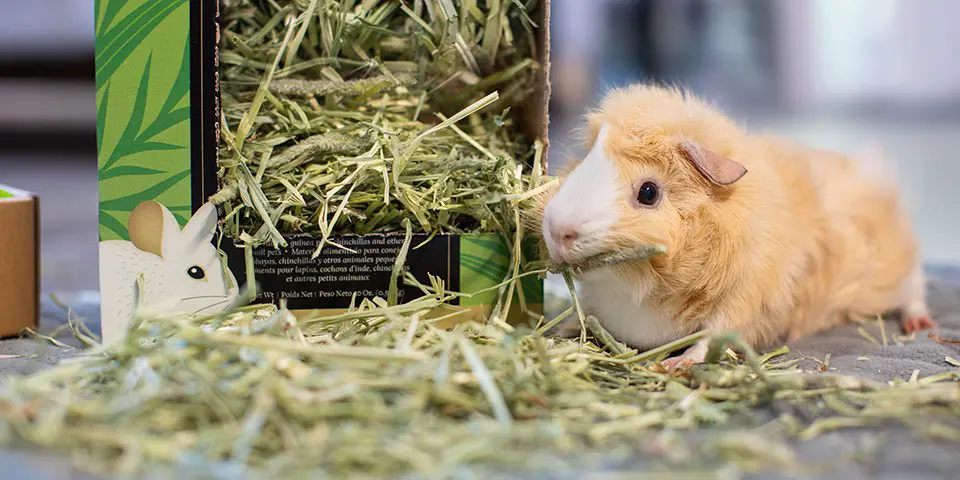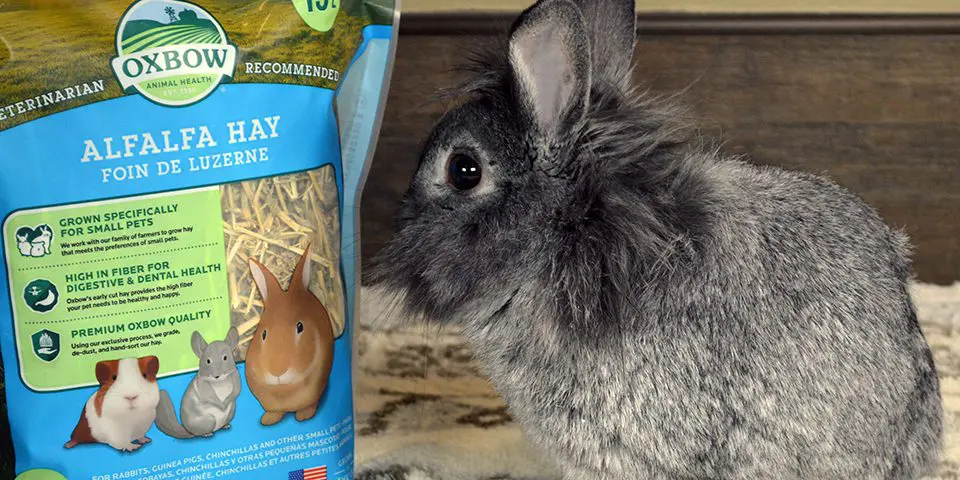Updated: May 29, 2024
Hay: it’s the nutritional foundation of herbivore health and a topic every new rabbit or guinea pig pet parent should be thinking about. As obligate herbivores in the wild, rabbits and guinea pigs naturally eat many types of different plant materials each day. As these small animals have made the transition “from wild to child,” it’s important for us as pet parents to remember the importance of variety and diversity when it comes time to offer hay to our bunnies and piggies.
So, where should pet parents start when it comes to providing hay for rabbits and guinea pigs?
In this guide, you’ll learn how much hay rabbits and guinea pigs should eat every day, and how much you need to provide. We’ll also cover what makes high quality hay so important to rabbit and guinea pig health and how to choose the best hay for your four-legged companion.
How Much Hay Should Rabbits Eat?
Hay plays a critical role in rabbit health, leading to healthy teeth and proper digestive system function. But how much hay should a rabbit eat?
Rabbits should have access to an unlimited supply of hay, with the freedom to eat as much as they need. A typical rabbit will need at least one rabbit-sized bundle of hay every day, but may eat more. This means your rabbit’s hay supply should be replenished as soon as it gets low.
How Much Hay Should Guinea Pigs Eat?
When it comes to guinea pigs and hay, the situation is almost identical to rabbits. So how much hay should a guinea pig eat every day?
Guinea pigs should eat as much hay as they desire and should have constant access to hay. Your average guinea pig eats at least one bundle of hay as big as its body each day, but may need more. So be sure to provide your guinea pig with hay 24/7!
Can Rabbits and Guinea Pigs Eat Too Much Hay?
The short answer is that you really can’t put too much hay in a rabbit or guinea pig’s habitat. It’s not really possible for rabbits to eat too much hay, nor is it possible for guinea pigs to eat too much hay. The more hay they have available, the greater their opportunity to constantly forage and graze, which is extremely important not just for their physical health, but for their mental stimulation as well. At the end of the day, the more hay you can reasonably offer your pet, the better.

Why Is Hay So Important for Rabbits and Guinea Pigs?
Hay is essential to your rabbit or guinea pig’s diet for many reasons, several of which we’ve just discussed. Here are the three most important functions of hay to keep in mind when it comes to your pet’s health are dental and gastrointestinal health.
Healthy Dentition
Did you know that rabbits’ and guinea pigs’ teeth never stop growing? Chewing hay provides natural mechanical wear and tear that keeps their teeth worn to healthy levels, preventing dental disease.
GI Health
One of the most important functions of hay for guinea pigs and rabbits is that it’s responsible for keeping the GI system moving. This process is called peristalsis. Fiber (particularly the insoluble components) is what keeps the GI tract moving at all times. A happy, healthy rabbit or guinea pig is one that is consuming large amounts of hay and pooping out fiber regularly.
Daily Activities
When it comes to hay for guinea pigs and rabbits, one thing we don’t often think or talk about is that your pet will not only eat their hay. They will also use it for bedding, burrowing, bathroom time, and play time. These activities are all part of their normal daily routines and one of the many reasons that keeping ample amounts of hay in their cage is extremely important.
What Types of Hay are Best for Rabbits and Guinea Pigs?
As we mentioned, small herbivores such as rabbits and guinea pigs are constantly accessing a wide diversity of different types of plant material in the wild. So, what are the best types of hay for rabbits and guinea pigs?
All grass hay varieties are appropriate and interchangeable as far as your pet’s digestive tract is concerned. While Timothy Hay is a great place to start, we also want to think about feeding different types. Access to a variety of tastes and textures has many benefits, including preventing picky eating habits and keeping mealtime fun and enriching.

What About Alfalfa?
It’s important to understand the difference between alfalfa and grass hays (such as Timothy) to understand how much alfalfa you should offer your rabbit or guinea pig and why.
Alfalfa is a legume that is a member of the sweet pea family. As such, alfalfa contains more protein and calcium than grass hays. Alfalfa can be offered freely to pets with higher energy needs, including young or growing and pregnant or nursing pets, but should only be offered as a treat for healthy, adult animals.
Senior pets may benefit from Alfalfa hay to help maintain a healthy weight if they are struggling to keep weight on, but before providing Alfalfa as more than a treat to an adult or senior animal it’s crucial to consult your exotics veterinarian to weigh the pros and cons.
If you focus on having ample amounts of high quality, high fiber grass hay in your rabbit or guinea pig’s habitat at all times, your munchkin will be going down the right nutritional path.
Oxbow Animal Health Hay for Rabbits and Guinea Pigs
Whether it’s our first-to-market Western Timothy Hay or our ultra-curated Prime Cut Hays, Oxbow’s premium hays are grown, harvested, and hand-sorted with each small pet like your rabbit, guinea pig, or chinchilla in mind. Get Oxbow’s farm fresh hay for your small herbivore from your favorite local and online retailers.
